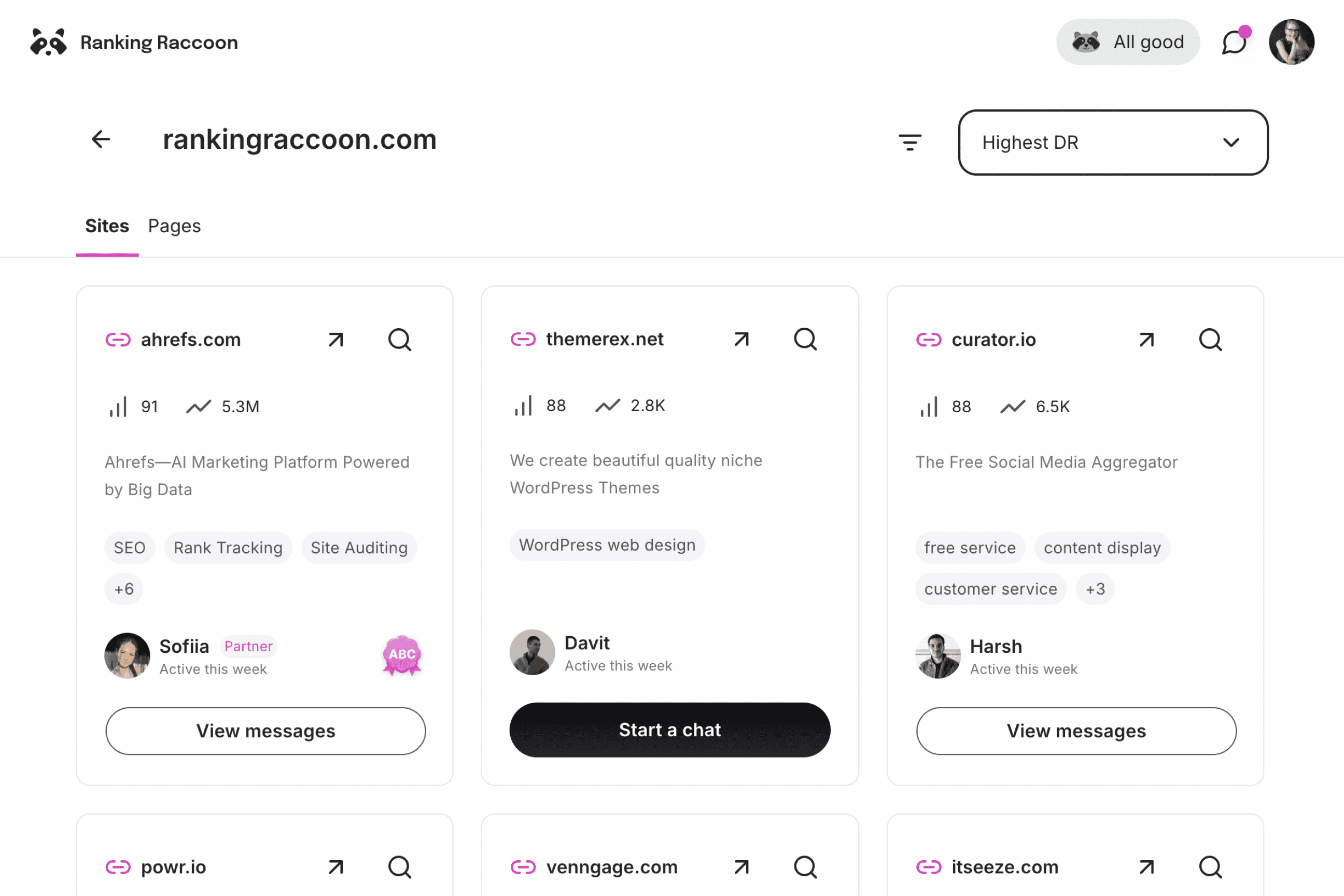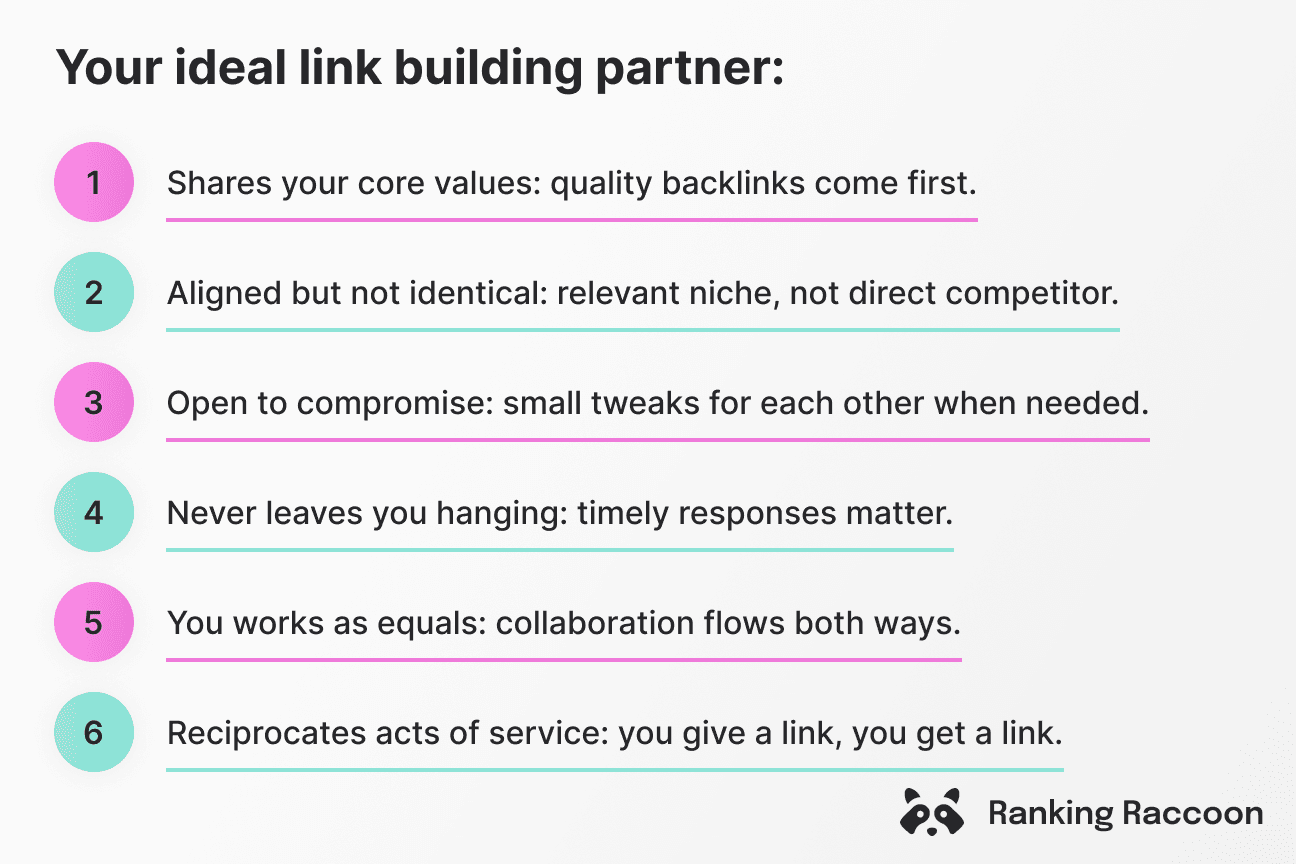How to Find Your Ideal Link Building Partners?

Eliza Forgacs
Link building in 2025 is unimaginable without networking. Sorry, lone-wolf SEOs: backlinks don’t fall from the sky. For real, sustainable growth, you have to constantly reach out, build relationships, and lock in trustworthy link building partners.
The problem? For every solid professional out there, there are ten spammers with sketchy “growth hacks” and zero understanding of long-term SEO.
In this article, we’ll break down why link building is still the backbone of SEO, explain why picking the right link building partner matters more than ever, and guide you through SEO networks, platforms, and real-world strategies for natural, long-lasting connections.

Staying Up-to-Date in a Forever Changing System
Google’s algorithm is an ever-evolving system, which never takes a vacation. Thanks to this, there is this underlying excitement of the unknown—because you can never know for sure what the current expectations are.
Although there is something I'm 100% sure of: what worked in 2015 might get you penalized in 2025. Back in the early internet days, ranking on Google was so much easier. Keyword stuffing + some backlinks, and voilá—you were number 1.
Now the same mentality is just not enough. Finding your right keywords is just the tip of the iceberg—you must mind content quality, site performance, user experience, and a healthy, natural backlink profile.
How is it that some sites seem to float to the top almost effortlessly, while others work sweat and tears—and the result is still nothing? Well the secret ingredient isn’t magic, it’s people. Who you know, how well you collaborate and how naturally your links grow.
What is SEO in Networking?
Acquiring quality backlinks can help you get on top (check out this advanced SEO checklist, so you don’t miss out on anything crucial). But how to get these precious links for your website?
With SEO networking.
We spend so much time perfecting our content, our website’s loading time and getting our brand a few minor mentions in listicles. But the most fruitful strategy that keeps a business moving is (was, and always will be) relationships.
SEO networking means building relationships and collaborations with websites, bloggers, influencers, and other SEO professionals to earn high-quality backlinks (rather than cold-blast outreach). It’s relationship over volume. It’s trust over trickery. And it’s often more sustainable. Relationship-based link building is exactly that: nurturing connections so that links become natural byproducts.
What is an SEO Platform?
Now that we explored what SEO networking is—it’s time to expedite the infrastructure where it can happen.
An SEO platform is a digital tool or system that helps you streamline and manage the complex tasks of search engine optimization. Beyond basic rank tracking, modern platforms often combine multiple functions: backlink analysis, keyword monitoring, outreach workflows, partner management, and campaign reporting.
Importantly, some SEO platforms also incorporate SEO networks. These are built-in ecosystems where publishers, bloggers, and webmasters can discover each other, connect, and collaborate. This networked element transforms the platform from a static toolkit into a living community, where you can identify and vet potential link building partners in a structured, more transparent way.Let’s break down related types of networks you’ll lean on:
- SEO Network: An umbrella term for interconnected communities of SEO professionals, site owners, and marketers working together to create value through collaboration.
- SEO Social Network: Social/communication platforms (LinkedIn groups, Slack, Discord, Facebook groups) where SEOs hang out, share tips, and sometimes partner up.
- SEO Blog Network: A cluster of independent or semi-independent blogs that collaborate—guest posting, content sharing—to swap exposure and links (ideally ethically).
- SEO Content Network: Platforms designed for large-scale distribution of articles, infographics, videos, and other assets, making it easier to reach new audiences and earn backlinks organically.
These networks are part of your toolbox when looking for a trusted link building partner.

Ranking Raccoon: A Link Building Community at Its Core
Ranking Raccoon was born out of frustration. Endless prospecting, cold outreach and fighting with ghosting, forbidden paid link propositions—until we had enough. The platform was built to solve one of the biggest challenges in SEO: finding trustworthy partners in a safe, efficient, and transparent environment.
As a relationship-driven network, Ranking Raccoon enables professionals to move beyond one-off outreach campaigns. Members can:
- Connect with vetted partners across industries.
- Participate in structured and ethical link exchange opportunities.
- Build long-term, reciprocal relationships based on relevance and trust.
- Find relevant link building partners in just minutes.
In short, Ranking Raccoon doesn’t just simplify prospecting and outreach—it gives you a community. That combination is what makes an SEO platform truly powerful in today’s landscape.
What Makes a Good Link Building Partner?
If you’re on the lookout for copybook link building partners, think of it like dating. Only instead of dinner and flowers, you’re trading backlinks. The goal is mutual growth—in this case this means increasing each other's domain authority, visibility, and organic traffic.
So the perfect SEO relationship bears an uncanny resemblance to a romantic bond:
- A true partner is someone who shares your core values.
Meaning: You both put high-quality backlinks above all. - You’re aligned, have similar interests, but also have enough differences to keep things exciting.
Meaning: You share the same target audience, but aren’t direct competitors. Your link building partner’s niche is relevant to your business. - You are open to compromises for each other.
Meaning: Willing to tweak content and make small edits for each other when needed. - You never leave each other hanging.
Meaning: You both reply in a timely manner, not three weeks later with a half-baked excuse. - You work together like equals.
Meaning: Your link building collaboration flows both ways and you put in equal efforts. - Acts of service are reciprocated.
Meaning: You don’t keep score on everything, like a toxic ex, but if you give a backlink, they give one back.

Where to Find Trustworthy Link Building Partners?
Finding a reliable link building partner isn’t as easy as typing “SEO collaboration” into Google. The reality is that the digital landscape is flooded with low-quality directories, spammy outreach emails, and self-proclaimed “growth hackers” who care more about quantity than quality. To succeed in 2025 and beyond, you need partners who share your values: relevance, transparency, and a long-term mindset.
These partners aren’t hiding in spam folders—they’re in places where professionals actually connect: LinkedIn groups, SEO Slack/Discord communities, industry meetups, and guest posting collaborations.
And if you’d rather skip the guesswork, platforms like Ranking Raccoon make it easier. It’s not just an SEO tool—it’s a curated link building community, built to connect you with vetted, relevant partners who actually value long-term collaboration.
The Truth About Relationship-Based Link Building
Relationship-based link building isn’t a buzzword—it’s a must in modern SEO. The idea is to build a network of trusted partners and regularly exchange or support each other’s content, rather than blindly sending cold link requests.
Among its benefits:
- Scalability: With a network of partners, your link opportunities multiply.
- Access: Your partners may have access to sites you couldn’t otherwise reach.
- Trust & longevity: Instead of one-off links, you get ongoing relationships.
But beware: if every partner is doing the same thing, it becomes a link farm (a web of forced reciprocal links). That triggers Google alarms.
How to Do Backlink Exchange the Right Way?
Let’s be clear: direct, one-to-one link exchanges (“you link me, I’ll link you back”) are risky business. Google’s latest spam policies specifically call out excessive reciprocal linking as manipulative behavior—and that’s not the reputation you want for your site.
Instead, think bigger. Healthy backlink exchange works best when it looks and feels like what it should be: a natural, diverse web of connections. Here’s how to do it right:
- Avoid direct reciprocity. Don’t just swap links back and forth between the same two domains. It’s too obvious, too risky.
- Think in ABC (or even multi-site) patterns. For example: Site A links to Site B, Site B links to Site C, and Site C links to Site A. This creates a more natural, network-like structure that avoids the “reciprocal trap.”
- Work with partners who own multiple quality sites. If your link partner has a portfolio of relevant, trustworthy domains, the links look more organic and are less likely to trigger red flags.
- Always prioritize relevance and quality. A link only helps if it comes from a contextually relevant, valuable piece of content. Random cross-linking across unrelated niches won’t fool Google.
- Diversify your link sources. The healthiest link profile includes guest posts, editorial mentions, resource pages, and genuine collaborations—not just exchanges.
By following these principles, backlink exchange stops looking like a cheap growth hack and starts functioning as what it should be—a natural reflection of real partnerships and shared expertise.
Conclusion: How Do I Network with Other SEO Professionals?
Networking in SEO isn’t about hoarding email addresses or firing off cold pitches—it’s about cultivating real partnerships. Be generous first: share insights, promote others’ work, and give before you ask. Stay visible in SEO communities, contribute to discussions, and jump into collaborative projects like webinars or roundtables. That’s how trust is built.
And remember: a great link building partner is not just a backlink source—they’re a strategic collaborator who can elevate your entire SEO game. In 2025, the winners won’t be those chasing random link swaps, but those investing in relationship-based link building, leveraging SEO networks (social, blog, and content), and following Google’s guidelines with smart, compliant strategies.
If you want to skip the noise and connect directly with vetted professionals, Ranking Raccoon makes it easy. It’s a thriving link building community where genuine partnerships start and long-term SEO success grows.
If you build ethically, maintain relevance, and cultivate real connections, your backlink profile will grow naturally—and your rankings will follow.
Frequently Asked Questions
What are the 4 types of SEO?
The four core types of SEO are on-page SEO (optimizing content and keywords), off-page SEO (link building, digital PR, partnerships), technical SEO (site speed, crawlability, structured data), and local SEO (visibility in local search results). For link building, off-page SEO is where your link building partner strategy makes the biggest impact.
What is the 80/20 rule for SEO?
The 80/20 rule suggests that 20% of your SEO efforts bring 80% of your results. In practice, this often means focusing on relationship-based link building and quality content—not wasting time on low-value tactics. One solid link from the right partner can outweigh dozens of weak ones.
What does SEO content mean?
SEO content is any content created with both readers and search engines in mind. It provides genuine value, answers questions, and is structured for discoverability. In link building, strong SEO content is what makes your site attractive to potential partners in SEO blog networks and content networks.
Which is the best platform for SEO?
There’s no universal “best,” but the strongest platforms balance data, usability, and community. Traditional tools like Ahrefs, SEMrush, and Moz are great for analysis, while Ranking Raccoon is designed specifically to help you find link building partners and grow through relationships.

Eliza Forgacs
Marketing Manager
